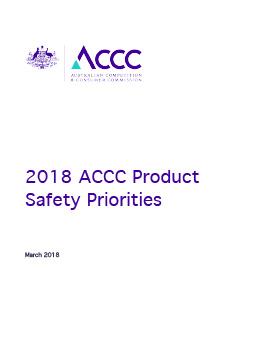Chairman Rod Sims today announced the ACCC’s product safety priorities for 2018 at the National Consumer Congress in Sydney, and reaffirmed support for a general safety provision to be introduced in Australia law to reduce the risk of unsafe goods entering the market.
“Today, I am proud to release a new policy which sets out how the ACCC prioritises and manages product safety risks, and the issues we will target in 2018. As an agency, it is essential that we prioritise our product safety resource allocation,” Mr Sims said.
“The ACCC receives 10,600 product safety reports each year, including 6,900 reports through our Infocentre, 3,100 compulsory notices by businesses of deaths and injuries, and 600 compulsory notices by businesses of voluntary recalls.”
“As an organisation, each year, we monitor about 630 active voluntary recalls, and undertake surveillance to check compliance with about 20 of the 66 safety standards and bans we administer.”
“In developing our product safety priorities each year, our work begins with an analysis of data on product injuries and deaths.”
This year, the ACCC will be targeting nine critical safety issues facing Australian consumers:
- The compulsory recall of vehicles with Takata airbags, which currently affects 2.3 million cars that have not had their airbag replaced yet
- Improving the safety of quad bikes which is one of leading causes of deaths on farms. On average, 16 people tragically die each year following accidents on quad bikes, with many more injured, including children
- Improving return rates for the Infinity electrical cables recall, which was announced in 2013 but almost five years later, only 52 per cent of the unsafe cabling that is subject to the voluntary recall has been found and replaced, with over 2,000 kilometres remaining in homes and businesses
- Reducing the risk from button batteries which can kill or injure a child within a few hours of being swallowed. Every week, around 20 children wind up in emergency departments following exposure to button batteries and sadly, children have died from their injuries in Australia.
- Working with state and territory consumer agencies to improve the safety of baby walkers and toppling furniture. About 50 children are in hospital each week due to furniture falling on them and again, there has been deaths following accidents. There have also been many injuries from baby walkers.
- Improving the safety of products supplied over the internet. With the explosion of online shopping, unsafe products can easily fall through the cracks.
- Reviewing those 66 compulsory safety standards and bans to make sure they’re working, and checking whether businesses are complying.
In addition, a key priority for the ACCC this year is working towards the introduction of the General Safety Provision into Australian Consumer Law.
“Most consumers are surprised to learn that it is not illegal to sell unsafe products in Australia. Indeed they purchase products with the expectation that they are safe,” Mr Sims said.
“Consumers put their trust in suppliers and known brand names as we are generally not in a position to assess hidden safety hazards at the point of sale ourselves.”
“Despite our best efforts, and yours, consumers are tragically injured and killed by unsafe products every year.”
“Why do we need a general safety provision? We need it because our current product safety laws are essentially reactive. They normally only come into play after a problem has occurred.”
“Like doctors, we believe that prevention is better than cure. We want to ensure that the goods and goods related services supplied in Australia are safe from the outset, and stop injuries and illnesses occurring in the first place.”
“As Australia’s current product safety system stands, we are lagging behind the UK, EU, Canada, Malaysia, Singapore and Brazil. It’s time we catch up with them and provide Australians with a reason to have greater confidence in the safety of the goods they purchase.”
The ACCC’s annual National Consumer Congress brings together stakeholders from across the public, private and community sectors to explore the key issues facing Australian consumers.
Further information on the Product Safety policy is at: ACCC 2018 Product Safety Priorities.
The Chairman’s speech is available at: 2018 product safety and consumer protection priorities.
.


